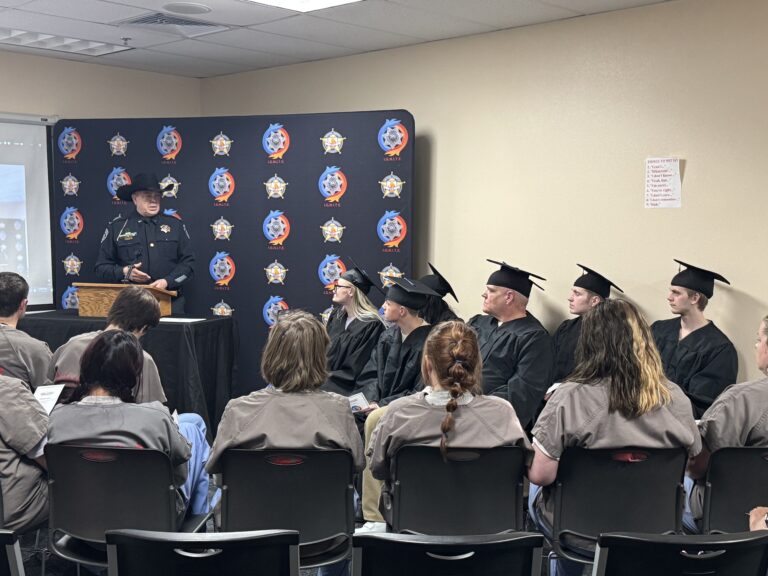Staying Ahead of COVID-19 in Corrections: Hernando County Detention Facility

By Kristine J. DeKany
BROOKSVILLE, Fla.—We have had many health scares over the last few decades, especially in the area of detention. All of which we prepared for. There was Avian flu, Swine flu, Ebola, Hepatitis A, and always on the horizon Tuberculosis. All of these contagious diseases would be disastrous in a confined detention setting and all of these we prepared for through screening tools and solid plans of action in a proactive manner. Thankfully, none of those illnesses ever entered our facilities. Then along came Coronavirus (COVID-19), which was a game changer. This new virus was more contagious than any seen thus far. Thankfully we at the Hernando County Detention Facility had the insight to prepare early and stay ahead of what would become the biggest pandemic the world has seen in a very long time.
It started with an e-mail in January to Major Klucznik while the Director of Medical Services, Kristine DeKany, was attending Leadership training. The Director advised the Major that according to the CDC our area was not currently of concern for COVID-19 but we needed to monitor the situation and ensure we had enough face masks on hand should the need arise. The Major agreed and immediately tasked one of the RN Managers to develop a screening tool. The screening tool was developed that day. It was a basic tool consisting of asking the inmate if they had recently traveled to China, or been around anyone who recently did, and the common symptom questions listed by the CDC of Cough, Shortness of breath, and fever. We would give anyone who replied yes to the questions a mask and immediately escort them to a reverse isolation room in Medical to be evaluated by the nursing staff. We shared our screening tool on the American Jail Association’s website and with the Florida Sheriff’s Association as one of the first Correctional setting screening tools, where it quickly adopted across the country as other facilities screening tool. This all sounds simple, right?
Not so simple we would soon discover. We bought 2,000 surgical masks and tried to buy N-95’s but we could not. We could not purchase any PPE’s; they were all quickly on backorder. COVID-19 was not in our area but New York was developing many cases. The word associated with COVID-19 quickly became “evolving.” Before we knew it, our lives also became evolving. We were now faced with COVID-19 in our country.
As COVID-19 began emerging in other states, we amped up our preparations and plans. Our COVID-19 screening tool was changed several times to keep up with the countries that had the greatest cases. It seemed our screening tool was now evolving daily. There still were no cases in our area, but there were now cases in state, south Florida specifically. It was then that we decided to stop changing the questions to name where an inmate or someone they were in close contact with had traveled to, and instead refer to a high risk COVID-19 list which we could update as needed. The pandemic really began spreading around the United States in “hot spot” pockets. We listened in on White House, NSA, FSA, CDC, NCHC, and ACA conference calls daily. We developed command staff COVID preparation meetings including the Major, Captain, Director of Medical Services, Administrative and Operation Lieutenants, and the classification and kitchen Sergeants. We made sure we had adequate supplies and made plans to supplement our inventory in the event we could not obtain items. Toilet paper became scarce in the private sector so we ordered extra to have on hand. The kitchen bought extra food. Classification made a list of all inmates over the age of 55 and medical made a list of inmates with medical risk factors that made them a higher risk. Classification made a new assignment for an inmate worker whose sole job was to walk around the facility with a deputy and sanitize surfaces; walls, doorknobs, tables, etc.
It was then decided that we would stop accepting transfers from other jurisdictions. Programs and volunteers were cancelled. This quickly spread around the state and became the norm. We developed a plan in advance that we would quickly put into place the moment we had the first case of COVID-19 in our county. We would empty out a housing unit with hard door cells and place all newly arrested inmates in quarantine for 14 days with a maximum of 3 per cell. We would assign 2 inmate workers to live in this pod and their job would be to come out and sanitize every surface and phone in between cells being let out to use the phones and showers. Only 1 cell would be let out at a time. The pretense behind this plan was that if we had a case of COVID-19 enter the facility via an inmate, it would be contained to a maximum of 3 inmates.
But what about the staff? Chances were one of them would likely be the vessel to bring COVID-19 into our detention center. We began role call training, educating all staff on how to keep themselves and their families safe. We kept all staff advised of updates and recommendations. We stayed ahead of COVID-19 through planning and communication. Then the day finally came, we had the first case in Hernando County of positive COVID-19. The classification department sprang into action, making all the moves to empty out the housing unit dedicated to housing the quarantine process. All of the inmates booked in that night went directly into quarantine after the booking process. The nurses asked the symptoms checklist daily and monitored temperatures. Things were moving smoothly. The quarantine process included issuing the inmates coming in a surgical mask and requiring it to be worn whenever they came out of their cell. We also began temperature checks on all staff entering the facility daily.
We are now 3 weeks into the quarantine process and it has proved successful. We fortunately have had zero cases of COVID-19, but if we do it will not spread throughout our jail. As with any communicable disease, the key is being proactive and not reactive. Gather as much information as you can, keep informed of what is going on, even in other parts of the world, because it can ultimately affect your facility and proper planning will mitigate potential negative outcomes.
Kristine J. DeKany, RN has a Masters Degree in Health with 20+ years of correctional health care experience, is the medical chairwoman of the Florida Model Jail Standards Medical (FMJS) Sub-Committee, and is considered the medical subject matter expert for the FMJS program. She also serves as director of medical services for the Hernando County Sheriff’s Office in Brooksville, Fla.






